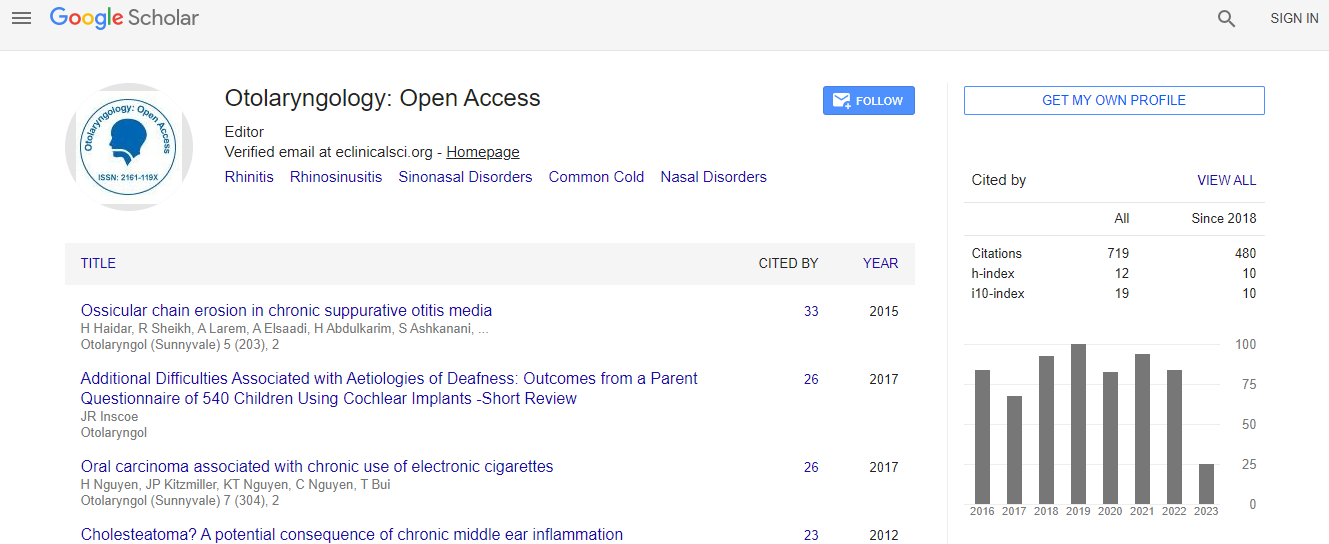Our Group organises 3000+ Global Conferenceseries Events every year across USA, Europe & Asia with support from 1000 more scientific Societies and Publishes 700+ Open Access Journals which contains over 50000 eminent personalities, reputed scientists as editorial board members.
Open Access Journals gaining more Readers and Citations
700 Journals and 15,000,000 Readers Each Journal is getting 25,000+ Readers
Google Scholar citation report
Citations : 925
Otolaryngology: Open Access received 925 citations as per Google Scholar report
Otolaryngology: Open Access peer review process verified at publons
Indexed In
- Index Copernicus
- Google Scholar
- Sherpa Romeo
- Open J Gate
- Genamics JournalSeek
- RefSeek
- Hamdard University
- EBSCO A-Z
- OCLC- WorldCat
- Publons
- Geneva Foundation for Medical Education and Research
- ICMJE
Useful Links
Recommended Journals
Related Subjects
Share This Page
Changes in the function of nose in patients with chronic polypoid rhinosinusitis
3rd International Conference and Exhibition on Rhinology & Otology
Vokhidov U N and Jalliyev B B
Tashkent Medical Academy, Uzbekistan
Posters & Accepted Abstracts: Otolaryngology
Abstract
Background: Chronic polypoid rhinosinusitis (CPRS) is a complex disorder that remains poorly understood and difficult to treat. The presence of nasal polyps or polypoid mucosa further complicates the treatment of this disease. Aim: The aim of this research was to study the functional characteristics of the nasal mucosa in patients with CPRS. Materials & Methods: In our research we investigate 150 patients who were hospitalized in the ENT department of the 3rd clinic of Tashkent Medical Academy from 2009 to 2013, diagnosed with "CPRS". All patients underwent functional studies of the nasal mucosa, which include transport, pH, absorptive and excretory function of nose. Results: In patient with chronic ├ó┬?┬?eosinophilic├ó┬?┬Ł polypoid rhinosinusitis, the functional studies of nasal mucosa shown, that rate of the transport function of the mucociliary system of nasal cavity by using saccharine test was 29-54 min. In patient├ó┬?┬?s transport function of mucociliary system was 36.3├?┬▒0.86 min. In the study of the pH value of nasal secretions using a special test paper figures of pH concentration were 7.4├?┬▒0.01. In determining the absorptive function of the nasal mucosa by introducing turund├É┬░ gauze moistened with a solution of 1% atropine with the definition of pupil reaction time was 89.9├?┬▒6.6 min. Cotton ball, weighing 21.7mlgr to determine the excretory function of the nasal mucosa, after the sample was 58.4├?┬▒0.8mlgr. And patients with ├ó┬?┬?neutrophilic├ó┬?┬Ł polypoid rhinosinusitis the functional studies of nasal mucosa shown, that transport function of mucociliary system was 37.5├?┬▒0.74 min. pH value of nasal secretions were 7.3├?┬▒0.01 and the pupil reaction time was 80.3├?┬▒4.0 min. Cotton ball weighting to determine the excretory function of the nasal mucosa, after the sample was 55.7├?┬▒0.8mlgr. In study of nasal function of control group transport function of mucociliary system was 11.5├?┬▒1.4 min, pH value of nasal secretions were 7.0├?┬▒0.01, the pupil reaction time was 68.2├?┬▒0.6 min. Cotton ball weighting was 41.25├?┬▒0.085mlgr. Our data reveal a violation of the transport function of the nasal mucosa, changes in hydrogen ion concentration (pH) of the nasal mucosa, reduced absorptive function of the nasal mucosa and increase in the secretory function of the nasal mucosa. Conclusion: From the above it follows that the conduct functional studies is informative importance in determining the status of the nasal mucosa and contributes to the proper choice of tactics of treatment of patients with CPRS.Biography
Email: MarengORL@fibertel.com.ar

 Spanish
Spanish  Chinese
Chinese  Russian
Russian  German
German  French
French  Japanese
Japanese  Portuguese
Portuguese  Hindi
Hindi 
